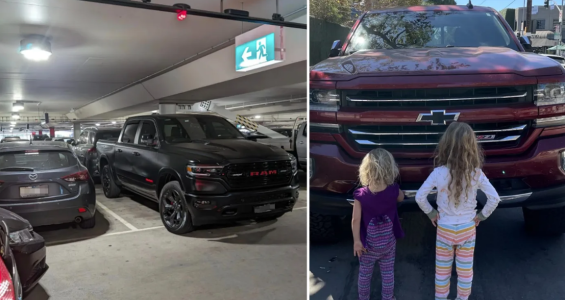Is this $250 Million Loophole Making Australia’s Roads More Dangerous? What You Need to Know Before Your Next Drive
By
Gian T
- Replies 9
If you’ve noticed the roads getting a bit more crowded—and the vehicles getting a whole lot bigger—you’re not imagining things. Australia is in the midst of a mega-ute and SUV boom, and it’s not just a matter of personal taste or changing lifestyles. There’s a $250 million loophole quietly fuelling this trend, and it’s costing all of us in more ways than one.
Let’s take a closer look at what’s really going on, why it matters, and what could be done to steer things in a safer, fairer direction.
The Luxury Car Tax Loophole: Why Big Utes and SUVs Get a Free Pass
First, a quick refresher: Australia’s luxury car tax (LCT) is designed to make buyers of high-end vehicles pay a little extra. If you buy a car worth more than $80,576 (as of this financial year), you’re hit with a hefty tax on the amount above that threshold. The idea is to make luxury cars a bit less attractive and to help level the playing field.
But here’s the kicker: most utes and SUVs are classified as 'light commercial vehicles,' and that means they’re exempt from the LCT—no matter how plush, powerful, or pricey they are. Whether you’re a tradie hauling tools or a city dweller using your dual-cab for the school run, you get the same tax break.
Associate Professor Milad Haghani, an expert in urban resilience at the University of Melbourne, says this loophole is a major reason why so many Aussies are choosing to 'go big' when buying a new car. 'If somebody is looking at a price range of $80,000 and above, there’s really an incentive to buy a pick-up truck or big car because then they get exempted from the whopping 30 per cent luxury tax, and it becomes quite attractive to the buyer,' he explains.
And let’s be honest: most of these vehicles aren’t being used for commercial purposes. They’re family cars, weekend warriors, and status symbols.
Who’s Really Paying the Price?
Here’s where it gets interesting—and a bit concerning. The Australian Institute estimates that this loophole costs taxpayers about $250 million every year. That’s money that could be going to schools, hospitals, or even fixing the potholes these heavy vehicles help create.
But the costs don’t stop there. Research shows that bigger vehicles have a much greater impact on road wear and tear, congestion, and pollution. In fact, Prof Haghani points out that a large ute, which can be twice the size of a small car, causes up to 16 times more road damage. That’s thanks to the 'fourth power law' in pavement engineering: double the axle weight, and you get 16 times the impact.
So, in effect, every taxpayer is subsidising the purchase and ongoing impact of these mega-utes and SUVs—even if you’re still happily driving your trusty hatchback.
A Nation of Big Cars: How Did We Get Here?
It wasn’t always this way. Less than 25 years ago, most Aussies drove small passenger vehicles—sedans, hatchbacks, and the like. Fast forward to today, and those cars make up just 17 per cent of new sales. A whopping 80 per cent of new vehicles sold are now SUVs, utes, vans, or light trucks.
Why the shift? Partly, it’s the tax loophole. But it’s also about changing tastes, clever marketing, and a sense that bigger is better (or at least safer). Yet, as city streets fill up with American-style pickups and oversized SUVs, not everyone is thrilled.
Cities Push Back: Are Mega-Utes Too Big for Our Streets?
Some local councils are starting to fight back. In Melbourne, the Yarra City Council voted to investigate higher parking fees for large vehicles, inspired by Paris’s move to charge big SUVs $30 an hour to park in the city centre. Greens Councillor Sophie Wade summed it up: 'The city’s streets simply weren’t designed for this kind of vehicle.'
It’s not just about parking, either. Standards Australia is even considering whether to increase the size of standard carpark spaces to accommodate the new normal.
Should Registration Fees Reflect Vehicle Size and Use?
Prof Haghani and other experts argue that it’s time for a rethink on how we charge for road use. Right now, only NSW and WA factor in vehicle weight when setting registration fees. Queensland and Tasmania use engine cylinders as a rough proxy, while Victoria bases fees on location.
A fairer system, they say, would consider not just the size and weight of the vehicle but also how often it’s driven. After all, a massive ute that’s only used on weekends is a different beast from one that’s pounding the pavement every day.
What’s Next? A Road User Charge on the Horizon
The federal government is already hinting at new road charges for certain drivers, and the debate is heating up. Should we close the luxury car tax loophole? Should big vehicles pay more to reflect their true cost to society? Or is this just another example of the 'nanny state' gone mad?
What Does This Mean for Seniors?
For many over-60s, the rise of mega-utes and SUVs is a mixed bag. On one hand, these vehicles can offer comfort, visibility, and a sense of safety. On the other, they make parking trickier, increase congestion, and can be intimidating for pedestrians and drivers of smaller cars.
If you’re in the market for a new car, it’s worth considering not just the upfront cost but the ongoing impact—on your wallet, your community, and the environment.
 Have you noticed more big utes and SUVs on your local roads? Do you think the luxury car tax loophole should be closed? Would you support higher registration or parking fees for oversized vehicles? Or do you think Aussies should be free to drive whatever they like, tax breaks and all? Let us know in the comments below.
Have you noticed more big utes and SUVs on your local roads? Do you think the luxury car tax loophole should be closed? Would you support higher registration or parking fees for oversized vehicles? Or do you think Aussies should be free to drive whatever they like, tax breaks and all? Let us know in the comments below.
Let’s take a closer look at what’s really going on, why it matters, and what could be done to steer things in a safer, fairer direction.
The Luxury Car Tax Loophole: Why Big Utes and SUVs Get a Free Pass
First, a quick refresher: Australia’s luxury car tax (LCT) is designed to make buyers of high-end vehicles pay a little extra. If you buy a car worth more than $80,576 (as of this financial year), you’re hit with a hefty tax on the amount above that threshold. The idea is to make luxury cars a bit less attractive and to help level the playing field.
But here’s the kicker: most utes and SUVs are classified as 'light commercial vehicles,' and that means they’re exempt from the LCT—no matter how plush, powerful, or pricey they are. Whether you’re a tradie hauling tools or a city dweller using your dual-cab for the school run, you get the same tax break.
Associate Professor Milad Haghani, an expert in urban resilience at the University of Melbourne, says this loophole is a major reason why so many Aussies are choosing to 'go big' when buying a new car. 'If somebody is looking at a price range of $80,000 and above, there’s really an incentive to buy a pick-up truck or big car because then they get exempted from the whopping 30 per cent luxury tax, and it becomes quite attractive to the buyer,' he explains.
And let’s be honest: most of these vehicles aren’t being used for commercial purposes. They’re family cars, weekend warriors, and status symbols.
Who’s Really Paying the Price?
Here’s where it gets interesting—and a bit concerning. The Australian Institute estimates that this loophole costs taxpayers about $250 million every year. That’s money that could be going to schools, hospitals, or even fixing the potholes these heavy vehicles help create.
But the costs don’t stop there. Research shows that bigger vehicles have a much greater impact on road wear and tear, congestion, and pollution. In fact, Prof Haghani points out that a large ute, which can be twice the size of a small car, causes up to 16 times more road damage. That’s thanks to the 'fourth power law' in pavement engineering: double the axle weight, and you get 16 times the impact.
So, in effect, every taxpayer is subsidising the purchase and ongoing impact of these mega-utes and SUVs—even if you’re still happily driving your trusty hatchback.
A Nation of Big Cars: How Did We Get Here?
It wasn’t always this way. Less than 25 years ago, most Aussies drove small passenger vehicles—sedans, hatchbacks, and the like. Fast forward to today, and those cars make up just 17 per cent of new sales. A whopping 80 per cent of new vehicles sold are now SUVs, utes, vans, or light trucks.
Why the shift? Partly, it’s the tax loophole. But it’s also about changing tastes, clever marketing, and a sense that bigger is better (or at least safer). Yet, as city streets fill up with American-style pickups and oversized SUVs, not everyone is thrilled.
Cities Push Back: Are Mega-Utes Too Big for Our Streets?
Some local councils are starting to fight back. In Melbourne, the Yarra City Council voted to investigate higher parking fees for large vehicles, inspired by Paris’s move to charge big SUVs $30 an hour to park in the city centre. Greens Councillor Sophie Wade summed it up: 'The city’s streets simply weren’t designed for this kind of vehicle.'
It’s not just about parking, either. Standards Australia is even considering whether to increase the size of standard carpark spaces to accommodate the new normal.
Should Registration Fees Reflect Vehicle Size and Use?
Prof Haghani and other experts argue that it’s time for a rethink on how we charge for road use. Right now, only NSW and WA factor in vehicle weight when setting registration fees. Queensland and Tasmania use engine cylinders as a rough proxy, while Victoria bases fees on location.
A fairer system, they say, would consider not just the size and weight of the vehicle but also how often it’s driven. After all, a massive ute that’s only used on weekends is a different beast from one that’s pounding the pavement every day.
What’s Next? A Road User Charge on the Horizon
The federal government is already hinting at new road charges for certain drivers, and the debate is heating up. Should we close the luxury car tax loophole? Should big vehicles pay more to reflect their true cost to society? Or is this just another example of the 'nanny state' gone mad?
What Does This Mean for Seniors?
For many over-60s, the rise of mega-utes and SUVs is a mixed bag. On one hand, these vehicles can offer comfort, visibility, and a sense of safety. On the other, they make parking trickier, increase congestion, and can be intimidating for pedestrians and drivers of smaller cars.
If you’re in the market for a new car, it’s worth considering not just the upfront cost but the ongoing impact—on your wallet, your community, and the environment.
Key Takeaways
- Critics are calling for state and federal governments to address a $250 million loophole that exempts most large utes and SUVs from the luxury car tax, encouraging Aussies to buy oversized vehicles.
- The current tax exemption means taxpayers are effectively subsidising big car purchases, which are causing increased road damage, congestion, and environmental pollution.
- Experts highlight that large vehicles, such as American-style utes and trucks, cause disproportionately more road damage due to their weight and want registration fees to better reflect vehicle size and usage.
- Despite rising consumer demand for big cars, some local councils and road safety advocates are pushing for higher charges and restrictions for oversized vehicles, arguing existing infrastructure wasn’t designed for them.








